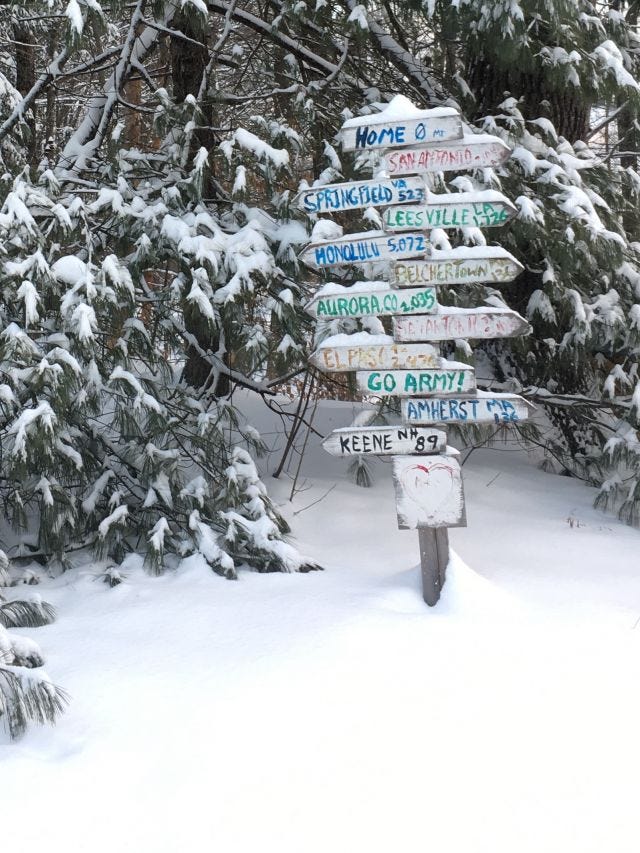RWL Newsletter #108

Greetings from the University of New Hampshire! Well, we got a lovely winter storm Tuesday night into Wednesday morning. I’d begun to think we might have just a grey winter, but we received about six inches of powder. And thank goodness it was powder because the shear pins in my snow blower broke during the last storm and I was waiting on Amazon to ship me some new ones. They conveniently arrived Wednesday afternoon, so my wife and I spent two hours shoveling out while the otherwise perfectly good snow blower (except for two little pins) watched from the garage. If you don't know what shear pins are, bless your heart.
This week, experiential learning,the benefits of procrastination, and post-work identity. It's a mixed bag, but all of the links are interesting.
Read
What: Fast Company, What happened when I followed Ben Franklin’s schedule for a month
Why: If you know me, you know I’ve done a bunch of these 30 day experiments. I love the idea of this one: following the schedule Benjamin Franklin laid out in his Autobiography. I first read BF’s AB when I was teaching a course called “Leadership through the Great Books”. It was a team-taught project, and one of the other professors proposed reading BF’s AB. Having never read it before, I was surprised by how very practical it was. The students loved it (frankly, more than me). There isn’t a lot of political commentary in it, which is somewhat disappointing given how important BF was to the American Revolution. In fact, most of the book is something of a proto-self help program, which is what this article explores. It’s definitely worth reading as a cultural artifact, to help you understand the culture of 18th century America. This short article is fun to reflect on. Leaders are constantly under pressure to be more efficient and effective. Franklin’s approach might indeed be timeless.
Watch
What: TED, The surprising habits of original thinkers, Adam Grant (15 minutes)
Why: I really enjoy Adam Grant’s work. He has a great podcast called Worklife.This TED Talk gives all of us procrastinators a bit of encouragement to take a little more time when trying to come up with creative solutions to problems. It turns out procrastination might be a vice for productivity, but is a virtue for creativity.
Listen
What: HBR Ideacast, How Retirement Changes Your Identity (28 minutes)
https://hbr.org/ideacast/2019/01/how-retirement-changes-your-identity
Why: I had the good fortune to hear Dr. Amabile and her colleagues discuss this emerging research on retirement and identity last summer at the Academy of Management conference. A new phrase I learned at this conference was “Me-search”, a play on research, where the researcher is engaging in the research effort admittedly because s/he is trying to understand something about her/his own life. I’m planning some research on physician retirement, so I was very interested to hear what they had to say. From the introduction to the podcast:
Teresa Amabile, professor at Harvard Business School, is approaching her own retirement by researching how ending your work career affects your sense of self. She says important psychological shifts take place leading up to, and during, retirement. That holds especially true for workers who identify strongly with their job and organization. Amabile and her fellow researchers have identified two main processes that retirees go through: life restructuring and identity bridging.
I think most executives, including healthcare executives (physician or not) have significant identity capital that begins to rapidly depreciate once one decides to retire. I’m very interested in this process and what it’s like. Watch for updates on my research, but in the meantime, check out this podcast.
Thanks for reading and see you next week! If you come across any interesting stories, won't you send them my way? I'd love to hear what you think of these suggestions, and I'd love to get suggestions from you. Feel free to drop me a line by e-mail, or you can tweet to me at @mbonica .
Also, if you find these links interesting, won’t you tell a friend? They can subscribe here: https://tinyletter.com/markbonica
Have a great weekend and do amazing things!
Mark
Mark J. Bonica, Ph.D., MBA, MS
Assistant Professor
Department of Health Management and Policy
University of New Hampshire
(603) 862-0598
mark.bonica@unh.edu
Health Leader Forge Podcast: http://healthleaderforge.org
"I know of no more encouraging fact than the unquestionable ability of man to elevate his life by a conscious endeavor." - Henry David Thoreau


